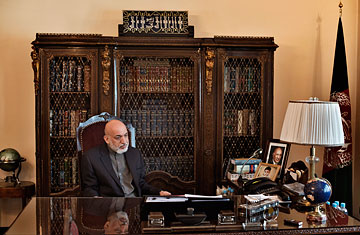
The isolated leader Karzai has become a virtual prisoner of the presidential palace, cut off from his country
Afghan President Hamid Karzai wants to know exactly what the U.S. wants from his country. It's simply not possible, Karzai suggests over the course of an hour-long interview with Time, that after 10 years and more than $533 billion, the world's most powerful military hasn't been able to subdue a ragtag militia. And then there is the matter of the botched 2009 Afghan presidential election. International election observers reported massive fraud conducted on behalf of Karzai's winning re-election campaign, but the 54-year-old accuses the West of trying to rig the election against him. "That makes me think as to what their intention is in this country," he says, leaning forward on the polished expanse of his desk at the presidential palace in Kabul. "That is why we are so suspicious, that is why we are turning every stone to find out if there is something else in the corner waiting for us."
Before my visit to see the President of Afghanistan, I had been warned that Karzai was on the verge of a breakdown, that his temper was out of control, that he was paranoid and had taken to dressing down subordinates in public. I dismissed those rumors as the gripes of those who had fallen out of favor. But once inside the palace, I was surprised to hear a few Karzai loyalists cheerily confirm one of the rumors as fact. "Oh yes, Karzai likes to yell," says Anwar Hamidi, an aide who handles catering at the palace. "His doctor told him to, that it was unhealthy to keep it bottled up. It's better for his heart to let things out." Though most Afghans would be shocked by such an obvious loss of self-control, Hamidi has learned not to take Karzai's occasional tantrum personally. "He shouts, and then he forgets. Who can blame him? It's a difficult job, and he's been doing it for 10 years."
That job is about to get a lot harder. On May 21, at the NATO summit in Chicago, U.S. President Barack Obama and Karzai announced that NATO forces would step back from combat operations to allow the Afghan army to take the lead in securing the country over the next year. Obama made it clear that his plan for withdrawing the nearly 90,000 U.S. troops currently operating in Afghanistan by 2014 was on track. Speaking to Time, Karzai suggests that foreign combat forces could leave as early as 2013, a year ahead of Obama's schedule. Within six months, he says, the Afghan army will be responsible for securing 75% of the country. The transition "is good for us," Karzai says, "and good for them. It's our country and we must defend it."
Brave words, but it's not like he has a choice. Just as Karzai has his suspicions about his American sponsors, so does the West have its doubts about Afghanistan. So while Obama announced at the NATO summit that it was time to "responsibly bring this war to an end," the only thing that will really be ending over the next two years is the West's responsibility to Afghanistan. The rest is up to Karzai, who, after a decade in the political passenger seat, must now take the wheel. And he must do so under the cloud of a faltering peace process with a resilient Taliban insurgency responsible for an unending stream of civilian and military deaths.
For Karzai — who has struggled to balance the needs of his broken nation against the demands of a coalition of Western powers determined to root out terrorism at any cost — it will be the ultimate test. After a decade of failure marked by accusations of egregious government corruption, can he finally become the leader Afghanistan needs? And even if he can, will he be able to hand that power over to a new democratically elected President once his own term ends in 2014? "You could foresee a situation where those elections in 2014 don't go well and we don't get a broadly supported government," says former Bush Administration National Security Adviser Stephen Hadley. "You could be handing over security to a government in the middle of a political meltdown, and that would not be a recipe for success."
Karzai has been the President of Afghanistan for 10 years, but now he truly has to lead — and little in Karzai's past suggests that he has the will, let alone the ability, to take on the challenge.
Fear in Kabul
Karzai thinks he's winning his war. "I can tell you with confidence that the Taliban as a force to threaten the government of Afghanistan, or the way of life we have chosen, is no longer there," he says. But Karzai's optimism seems absurd in the face of brutal facts outside the presidential palace. The Taliban have gained ground in the north and east, areas they had failed to conquer even when they were in power before the 2001 U.S. invasion. Last year's 3,021 civilian deaths marked the fifth straight year that the toll has risen; three-quarters of those killings have been attributed to the insurgency. Taliban commanders consistently tell Time that they want nothing to do with Karzai's peace overtures. The morning I met with Karzai, gunmen assassinated a prominent member of his High Peace Council. I ask if the assassination, attributed to a Taliban splinter group, would derail the peace process. "Not at all," he answers. "We cannot abandon seeking peace. It will happen."
